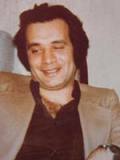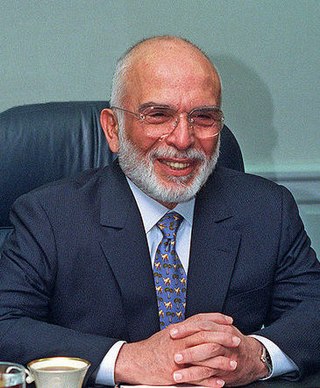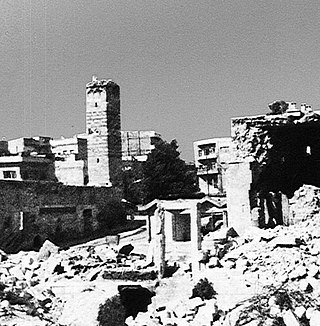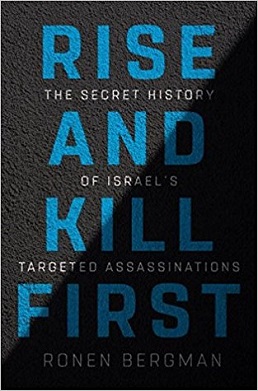
Yasser Arafat was a Palestinian political leader. He was chairman of the Palestine Liberation Organization (PLO) from 1969 to 2004 and president of the Palestinian National Authority (PNA) from 1994 to 2004. Ideologically an Arab nationalist and a socialist, Arafat was a founding member of the Fatah political party, which he led from 1959 until 2004.

Ali Hassan Salameh was a Palestinian militant who was the chief of operations for Black September and founder of Force 17. He was assassinated in January 1979 as part of an assassination campaign by Mossad.

Hussein bin Talal was King of Jordan from 11 August 1952 until his death in 1999. As a member of the Hashemite dynasty, the royal family of Jordan since 1921, Hussein was a 40th-generation direct descendant of Muhammad.

The Israel–Jordan peace treaty, sometimes referred to as the Wadi Araba Treaty, is an agreement that ended the state of war that has existed between the two countries since the 1948 Arab–Israeli War and established mutual diplomatic relations. In addition to establishing peace between the two countries, the treaty also settled land and water disputes, provided for broad cooperation in tourism and trade, and obligated both countries to prevent their territory being used as a staging ground for military strikes by a third country.

The Lebanese Civil War was a multifaceted armed conflict that took place from 1975 to 1990. It resulted in an estimated 150,000 fatalities and also led to the exodus of almost one million people from Lebanon.

By Way of Deception: The Making and Unmaking of a Mossad Officer is a nonfiction book by a former katsa in the Mossad, Victor Ostrovsky, and Canadian journalist and author Claire Hoy.

Fathi Ibrahim Abdulaziz Shaqaqi was a Palestinian physician, militant leader and the founder and Secretary-General of the Palestinian Islamic Jihad (PIJ).
Operation Bayonet was a covert operation directed by Mossad to assassinate individuals they accused of being involved in the 1972 Munich massacre. The targets were members of the Palestinian armed militant group Black September and operatives of the Palestine Liberation Organisation (PLO). Authorised by Israeli Prime Minister Golda Meir in the autumn of 1972, the operation is believed to have continued for over twenty years. While Mossad killed several prominent Palestinians during the operation, they never managed to kill the mastermind behind Munich, namely Abu Daoud.

Mahmoud Abdel Rauf al-Mabhouh was the chief of logistics and weapons procurement for Hamas's military wing, the Izz ad-Din al-Qassam Brigades. He is remembered for his assassination in Dubai and the diplomatic crisis his assassination triggered after Mossad agents allegedly used forged foreign passports to carry out the killing.

The assassination of Mahmoud al-Mabhouh took place on 19 January 2010, in a hotel room in Dubai. Al-Mabhouh—a co-founder of the Izz ad-Din al-Qassam Brigades, the military wing of Hamas—was wanted by the Israeli government for the kidnapping and murder of two Israeli soldiers in 1989 as well as purchasing arms from Iran for use in Gaza; these have been cited as a possible motive for the assassination.

The Institute for Intelligence and Special Operations, popularly known as Mossad, is the national intelligence agency of the State of Israel. It is one of the main entities in the Israeli Intelligence Community, along with Aman and Shin Bet.

The Islamist uprising in Syria comprised a series of protests, assassinations, bombings, and armed revolts led by Sunni Islamists, mainly members of the Fighting Vanguard and, after 1979, the Muslim Brotherhood, from 1976 until 1982. The uprising aimed to establish an Islamic Republic in Syria by overthrowing the Ba'athist government, in what has been described by Ba'ath Party as a "long campaign of terror".

The State of Israel and the Kingdom of Saudi Arabia have never had formal diplomatic relations. In 1947, Saudi Arabia voted against the United Nations Partition Plan for Palestine, and currently does not recognize Israeli sovereignty. However, as of 2023, bilateral negotiations towards Israeli–Saudi normalization are ongoing, with the United States serving as the two sides' mediator.

The Iran–Israel proxy conflict, also known as the Iran–Israel proxy war or Iran–Israel Cold War, is an ongoing proxy conflict between Iran and Israel. In the Israeli–Lebanese conflict, Iran has supported Lebanese Shia militias, most notably Hezbollah. In the Israeli-Palestinian conflict, Iran has backed Palestinian groups such as Hamas. Israel has supported Iranian rebels, such as the People's Mujahedin of Iran, conducted airstrikes against Iranian allies in Syria and assassinated Iranian nuclear scientists. In 2018 Israeli forces directly attacked Iranian forces in Syria.

The Popular Front for the Liberation of Palestine (PFLP) is a secular Palestinian Marxist–Leninist and revolutionary socialist organization founded in 1967 by George Habash. It has consistently been the second-largest of the groups forming the Palestine Liberation Organization, the largest being Fatah.

Khaled Mashal is a Palestinian political leader who is the former head of the militant organization Hamas.
The State of Israel has been accused of engaging in state-sponsored terrorism, as well as committing acts of state terrorism on a daily basis in the Palestinian Occupied Territories. Countries that have condemned Israel's role as a perpetrator of state-sponsored terrorism or state terrorism include Bolivia, Iran, Lebanon, Saudi Arabia, Syria, Turkey, and Yemen.

Palestinian nationalism is the national movement of the Palestinian people that espouses self-determination and sovereignty over the region of Palestine. Originally formed in the early 20th century in opposition to Zionism, Palestinian nationalism later internationalized and attached itself to other ideologies; it has thus rejected the occupation of the Palestinian territories by the government of Israel since the 1967 Six-Day War. Palestinian nationalists often draw upon broader political traditions in their ideology, such as Arab socialism and ethnic nationalism in the context of Muslim religious nationalism. Related beliefs have shaped the government of Palestine and continue to do so.

Rise and Kill First: The Secret History of Israel's Targeted Assassinations is a 2018 book by Ronen Bergman about the history of targeted assassinations by Israel's intelligence services. Its author says that Israel has assassinated more people than any other western country since World War II. It portrays the assassinations of British government officials, Hamas, Hezbollah and Palestine Liberation Organization (PLO) leaders, and Iranian nuclear scientists. To write the book, Bergman carried out about a thousand interviews with political figures and secret agents and consulted "thousands" of documents.
















